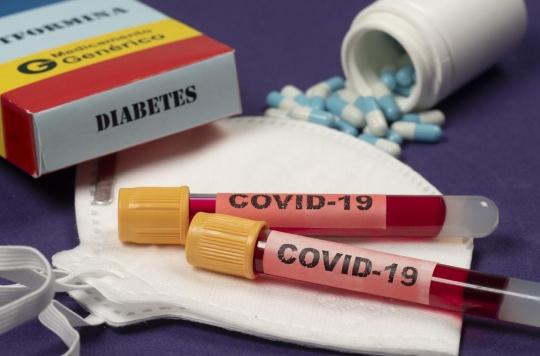Causes, treatments, management… Research is progressing in the field of diabetes. As part of a new series devoted to this disease, Why doctor collected the words of Professor Bertrand Cariou, endocrinologist doctor (director of the Institut du thorax / CHU de Nantes), to understand how diabetes can aggravate Covid -19.

- More than 4.5 million people in France have diabetes, but about 1 million of them are unaware of it.
- Diabetes is “one of the world’s leading killers”, along with high blood pressure and smoking, according to the World Health Organization (WHO).
Since the start of the Covid-19 pandemic, it has become apparent that diabetes is a risk factor for the severe form of the disease. Why this increased risk? What are the characteristics and prognosis of diabetic patients treated for Covid-19?
Poor prognostic factors of Covid-19 have been identified
To answer these questions, a French multicenter study called CORONADO was carried out in mid-March in nearly 3,000 diabetic patients hospitalized for a Covid-19 infection. For this, it called on 68 diabetology centres, public and private, in mainland France and overseas. The severity of Covid-19 in these patients was assessed after a 28-day follow-up. At the end of this period, one in five diabetics had died, and a third of patients were still hospitalized or transferred to a rehabilitation center.
Very quickly, poor prognostic factors for Covid-19 were identified: elderly, male sex, microvascular complications (retinopathy, renal failure, etc.). Among these, age quickly emerged as the most important prognostic factor associated with mortality. Thus, the typical CORONADO patient is 70 years old on average and is predominantly male.
What impact of the treatments?
“What about treatments? What impact on the prognosis of Covid-19?”, asks Professor Bertrand Cariou, an endocrinologist. “Some of them, such as metformin, seem rather protective because they are linked to a reduction in the risk of death at 28 days in the entire population of CORONADO. Conversely, insulin, which testifies to a more advanced diabetes, is linked to the most severe cases among hospitalized patients”, he reported at the last congress of the Francophone Diabetes Society (SFD).
The impact of obesity has also been studied. Result: alongside diabetes, obesity has been identified as another metabolic comorbidity contributing to severe forms of Covid-19. More precisely, it is associated with the risk of intubation, but not of death (at 7 and 28 days of follow-up). “One of the important elements highlighted in the study is that the deleterious link between obesity and the severity of Covid-19 was only found in patients under the age of 75. emphasizes Bertrand Cariou. “In the oldest (> 75 years), the risk is probably more related to malnutrition (lower weight)”, he adds.
Covid-19 is mainly related to age rather than the type of diabetes
Moreover, according to the analyses, the severity of Covid-19 seems to be lower in type 1 diabetic patients compared to those with type 2 diabetes. This observation mainly concerns the youngest patients (less than 55 years), while the risk of death is identical in the oldest (over 75 years). This suggests that the prognosis of Covid-19 is primarily related to age rather than the type of diabetes. In patients with type 1 diabetes, less than 3% of deaths are recorded, and none in those under 65 years of age.
“In summary, the results of the CORONADO study show that in the face of Covid-19, priority should be given to protecting elderly subjects (over 70 years old), especially if they have microvascular complications”. concludes Bertrand Cariou.

.
















